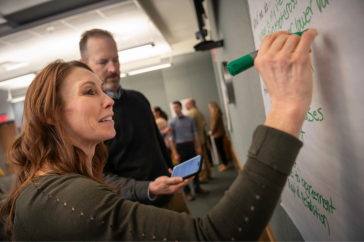
When I joined the Paul College of Business and Economics three years ago, I was struck by the relatively low percentage of women–only 37 percent in our undergraduate and graduate business programs, and only 20 percent in our undergraduate economics programs. This was well below the 54 percent representation of women among undergraduates at the University of New Hampshire as a whole. Our representation also was below the 41 percent average for AACSB-accredited business schools.
As someone who has worked on closing the women’s leadership gap in the world of work for more than 20 years, I am committed to strengthening the representation of women at Paul College and positioning the college as a source of well-prepared female leadership talent for the employers with which we work.
Business schools have a critical role to play in closing the women’s leadership gap in business organizations. We award 20 percent of all bachelor’s degrees and 25 percent of all master’s degrees in the United States. What we do in our schools to build and shape the pool of future leadership talent has a direct and material impact.
While progress has been made, the leadership gap between men and women stubbornly persists in business.
Today, women hold only 4 percent of the CEO positions in Fortune 500 companies, 25 percent of senior management positions, and 17 percent of board seats. The dearth of women in leadership not only limits the potential of aspirational, high-performing women to contribute fully to their organizations, but it also impacts organizational performance. Numerous studies support this argument. A 2000 Catalyst study showed a positive correlation between companies’ return on equity and the percentage of women on their boards and in senior management. Similar findings emerged from studies by McKinsey in 2008, Credit Suisse Research Institute in 2014, and Morgan Stanley in 2016. We have seen that companies committed to advancing women’s leadership will expand their access to global talent, bring more diverse perspectives to bear on problem-framing and problem-solving, spark broader innovation, better align with diverse customers and reduce expensive attrition.
To help address the women’s leadership gap, Paul College is committed to fueling the pipeline of women prepared for leadership. We have made progress in the last three years. We now have 40 percent women in our undergraduate business programs, 38 percent in our graduate business programs, and 33 percent in our undergraduate economics programs. We have strengthened our recruitment efforts to attract women, supported the development of a Women in Business club and an annual Women in Business Conference, initiated a mentoring program for interested women students, and involved many more women alumni in our engagement activities for students and alumni.
But there is much more to do and now we are fortunate to be able to move this initiative forward more robustly. In support of our efforts, Morgan Rutman ’84 and his wife Tara, in conjunction with the Och Family Foundation, have invested $1.7 million to fund the Rutman/Och Advancing Women’s Leadership Initiative. The gift will provide 100 four-year scholarships, reinforce our efforts to recruit more women of diverse backgrounds and prepare them for leadership, and support both male and female students to appreciate the value of gender diversity in leadership and the important role that they can play as advocates and allies in advancing women’s leadership.
We are very grateful to Morgan and Tara Rutman and the Och Family Foundation who share our vision and trust in the example we can set and the contribution Paul College can make to closing the women’s leadership gap in business.
-
Written By:
Deborah Merrill-Sands | Dean, Peter T. Paul College of Business and Economics
















































